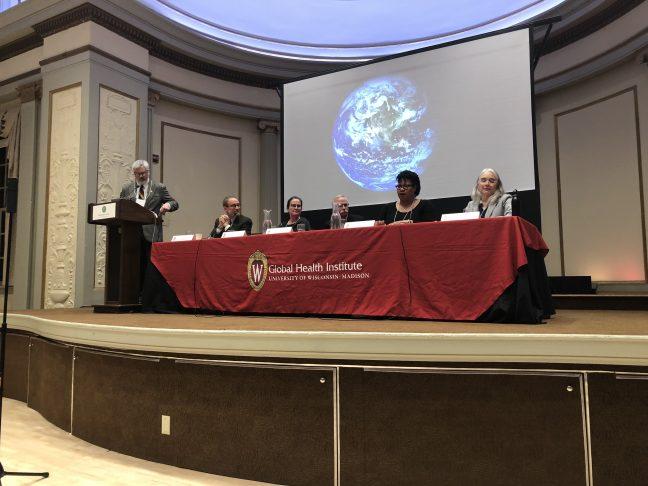The University of Wisconsin hosted a seminar Thursday about the effects of climate change on global health.
University of Washington professor of environmental and occupational health sciences Howard Frumkin was the keynote speaker for Thursday night’s lecture, which was sponsored by Wisconsin’s Office of Sustainability and hosted by the Global Health Institute, Wisconsin’s International Division and the Nelson Institute for Environmental Studies.
Frumkin’s lecture focused on the impact environmental health can have on the human populations around the world.
“We live on an infinitely beautiful and complex planet,” Frumkin said. “We depend on the planet for sustenance, support, inspiration and wellbeing. Our planet is fragile, and our planet is changing.”
Madison-based company will test ‘revolutionary’ universal flu vaccine this spring
Frumkin’s main points highlighted how climate change, chemical contamination, changes in water, changes to land and loss of biodiversity affect human populations most.
With climate change comes an increase in heat waves, which Frumkin said can lead to a rise in deaths. While people can adapt to the change, Frumkin said food and water carry more diseases when exposed to hotter weather.
Chemicals and plastics in the environment cause more deaths in animals, birds and fish, and can affect neurodevelopment in humans as well, Frumkin said.
“We don’t fully understand the geographic extent of global chemical contamination and its pathways through ecosystems,” Frumkin said. “But it’s very clear that this planetary change does no favors to ourselves, or to ecosystems.”
Frumkin said groundwater depletion, changing river conditions, tree cover reduction and pollen can lead to an increase in diseases.
Can carbon be used for clean energy? One UW professor says it’s possible
Frumkin said he has not lost hope, however. He said some environmental changes could be beneficial.
“Some planetary changes may offer benefits — such as higher agricultural yields — or more physical activity in cold areas getting warmer,” Frumkin said.
Following his lecture, Frumkin was joined by Wisconsin environmental sociology professor Monica White, medical history professor Gregg Mitman, veterinary medicine professor Lyric Bartholomay and population health sciences professor Maureen Durkin.
The panelists, moderated by Wisconsin’s International Division associate dean Rick Keller, discussed how smaller communities like Madison can help reverse damages.
“I think one of the things [the University] can consider is whether we can make planetary health a more central theme in everything we do — in every course of study, in every research program, and in every outreach activity,” Durkin said. “I think we need an interdisciplinary effort across campus like nothing we’ve seen before to pose the challenges related to planetary health.”
Many of the panelists — including Mitman, who credited Wisconsin for his ability to undertake interdisciplinary endeavors — highlighted the Wisconsin Idea as one of the main reasons Wisconsin is a great place to foster planetary change.
Frumkin agreed with the other panelists and outlined his high hopes for the world under the millennial generation’s guidance.
“UW is educating huge numbers of students that understand planetary problems are a huge thing,” Frumkin said. “Additionally, millennials are moving to cities and driving less, and really engaging these problems. We’re also seeing a re-engagement in democracy in the young. So there are a lot of reasons to be optimistic about the future.”













